Portuguese Crypto Bison Bank Hunts Wealthy Latin Americans

From its Lisbon headquarters to clients scattered across 130 countries, Bison Bank—steered by Chinese Hong Kong capital—straddles traditional banking and the rapidly evolving cryptocurrency world. Its international clientele increasingly includes Latin Americans seeking financial security, convenience, and new investment horizons.
Balancing Traditional Banking and Cryptocurrency
When you step inside Bison Bank’s central Lisbon office, you enter a hub that merges European heritage and Asian influence. A painting inspired by Diego Velázquez’s Las Meninas hangs prominently, while elegant Oriental ornaments adorn the meeting room labeled “Hong Kong.” There, António Henriques, the bank’s 53-year-old CEO, explains his wide-ranging vision to EFE, detailing how the institution evolved into its present form: a private Portuguese bank with Hong Kong capital and an array of Latin American clients.
Formed in 2018 following the acquisition of the Portuguese Banif–Banco de Investimento by Hong Kong-based Bison Capital Financial Holdings, Bison Bank is neither a traditional retail operation nor a broad-credit venture. Instead, it zeroes in on wealth management, investment banking, and deposits, all while actively engaging in cryptocurrency services through its subsidiary Bison Digital Assets.
Henriques speaks candidly about the bank’s decision not to offer credit, a move set in motion when Banif–Banco de Investimento dissolved. Offering loans would have required “large resource commitments,” he explains, and the new ownership was eager to streamline operations to achieve profitability. The institution’s revenue is thus derived primarily from fees: these have grown from 2.1 million euros in 2018 to 4.6 million euros in 2024, mirroring the bank’s intensifying focus on advisory and brokerage services.
Meanwhile, Bison Digital Assets stands out as the only Portuguese commercial entity licensed to manage cryptocurrencies in conjunction with bank-grade standards. Henriques states the company differs from a bank yet faces many rules. He stresses his dedication to connecting typical banking methods with the growing cryptocurrency market. With a $3 trillion size, the cryptocurrency domain is not small, he claims, it changes things.
Latin American Outreach: Brazil, Mexico, and Beyond
One of Bison Bank’s distinguishing traits is its almost exclusive focus on international clients. “We have great pleasure in already having Latin American customers,” Henriques tells EFE, highlighting Mexico and Colombia as the major regional markets. He emphasizes, however, that the bank’s presence is global: “We have customers in 130 countries.”
Many of these clients hail from the United States, Brazil, and various Asian countries. They are typically high-net-worth individuals or those seeking stable alternatives to domestic financial systems. Political, social, or security considerations often motivate them to look overseas for safer and more versatile options.
Henriques highlights different types of customers. Some are purely interested in diversifying their assets internationally to reduce risk; for others, the draw is cryptocurrency. Still others may be wealthy individuals or families relocating and wanting to simplify their affairs. “People experience instability or limited prospects in their countries,” he states, “so we supply a supervised banking system in Europe for standard money plus crypto assets.”
Bison Bank becomes more relevant as Latin American economies exhibit distinct characteristics and political landscapes evolve. Henriques reports that many clients want to spread their investments across multiple international companies. This protects the assets from local instability. Bison Bank accounts to engage with current local services when clients implement their planned spreading strategy. “Who gets a customer’s confidence? Henriques says that customers place their trust in their local bank or financial advisor. “So they learn about Bison Bank through these relationships—through banks and advisors in their home countries.”
In practice, Bison Bank collaborates with partners to fill service gaps. For instance, in Latin America, it teams up with a Spanish bank—chosen partly for its linguistic and cultural alignment. Through this partnership, even though Bison Bank doesn’t offer loans, a client can still obtain housing credit indirectly, enabling them to buy property in Portugal.
China as a “Balancing Force” and Future Perspectives
Henriques also discusses how geopolitics shape international banking. Bison Bank is backed by Hong Kong capital, and while tensions between the United States and China have heightened, Henriques stresses that his institution’s investment strategy remains deliberately conservative. “We have very prudent, low-risk management of our investment portfolio,” he says. “The impact of global tensions is, in reality, immaterial for us.”
Still, this does not mean Bison Bank, or its leadership are oblivious to the shifting world order. Henriques observes that “everyone is angry with the U.S. these days,” which he believes presents a strategic opening for China to differentiate itself on the global stage—particularly in economic and trade matters. “It’s a great opportunity for China to show that it’s different,” he remarks while noting that people in Western nations often struggle to understand China’s approach or to discern the rationale behind its strategies.
In Henriques’s view, China can serve as a “balancing piece” to the United States, especially in emerging economies across Latin America, Africa, and parts of Asia. Bison Bank, positioned at the intersection of these interests, could become a channel for individuals and businesses looking to navigate new market realities. Those who are seeking to hedge their positions—whether in terms of financial assets or supply-chain relationships—may find synergy in a bank that is both European-regulated and Chinese-owned.
Henriques’s Realism on Crypto
Henriques is enthusiastic, but he avoids portraying cryptocurrencies as a simple solution to economic problems. Bison Digital Assets does manage crypto transactions with care. It operates subject to close regulatory supervision. For Henriques, the crypto space is a major growth area—yet it must be approached with caution to ensure it meshes well with compliance and anti-money-laundering regulations. “If we want to be fully credible as an institution, everything has to be above board,” he says.
Because of these strict controls, Bison Digital Assets maintains robust KYC (Know Your Customer) procedures and prospective crypto investors undergo thorough due diligence before they can engage. “We follow the same protocols as any bank would,” he points out. “We have to make sure we know who our clients are, their sources of funds, and their reasons for entering this market.”
An Evolving Client Base
Since becoming Bison Bank in 2018, the institution has grown from 598 clients to over 4,300 by 2024. Reflecting on how the bank has expanded so far and what the future holds, Henriques underscores the importance of forging trust through partnerships with well-known financial advisors and local banks. The bank positions itself as a complementary institution for customers instead of a competitor according to him because it employs a collaborative model which differentiates it from others in this highly competitive landscape with evolving consumer demands.
The strategy reflects current developments in specialized financial services where targeted expertise or worldwide networks outweigh traditional retail offerings for select wealthy clients. The bank maintains a focused strategy. It plans to build customer connections. The bank wants to provide wealth management services. It will study new possibilities for products based on crypto.
Portugal as a Financial Gateway
Portugal’s role in this story is also crucial. Long a bridge between Europe and the rest of the world—particularly Brazil and Africa—Portugal has made efforts to attract foreign investment and high-skilled immigrants through tax incentives and residency programs. With its Portuguese license and Hong Kong funding, Bison Bank positions itself as an appealing gateway for those seeking to move assets or start new ventures in Europe. The bank avoids the difficulty of keeping large capital reserves by not offering credit. This helps it stay agile plus profitable even at a smaller size.
Henriques thinks cross-border collaboration will remain important in the future. He expects international clients—especially in Latin America—to continue searching for transparent, regulated havens to protect or diversify their assets. Bison Bank’s aim is to meet that need, whether through traditional banking products, tailored advice, or digital assets. “What we bring,” Henriques says, “is a kind of synergy—where different cultures, regions, and financial instruments converge in a stable, well-supervised environment.”
Also Read: Mercado Libre Strengthens Brazil’s E-Commerce Dominance with Bold Billions
Given the continuing expansion of Bison Bank’s offerings and the global economic uncertainty driving investors toward alternative banking solutions, Henriques remains confident in the institution’s future. Global trade disputes, new financial technologies, and shifting geopolitical alliances affect the environment where Bison Bank does business. The main purpose of the bank centers on developing confidence with international partners. Latin American clients have confidence in Bison Bank. The institution shows it can supply regulated solutions and confirms it is a reliable partner, one that understands how to handle uncertainty.





